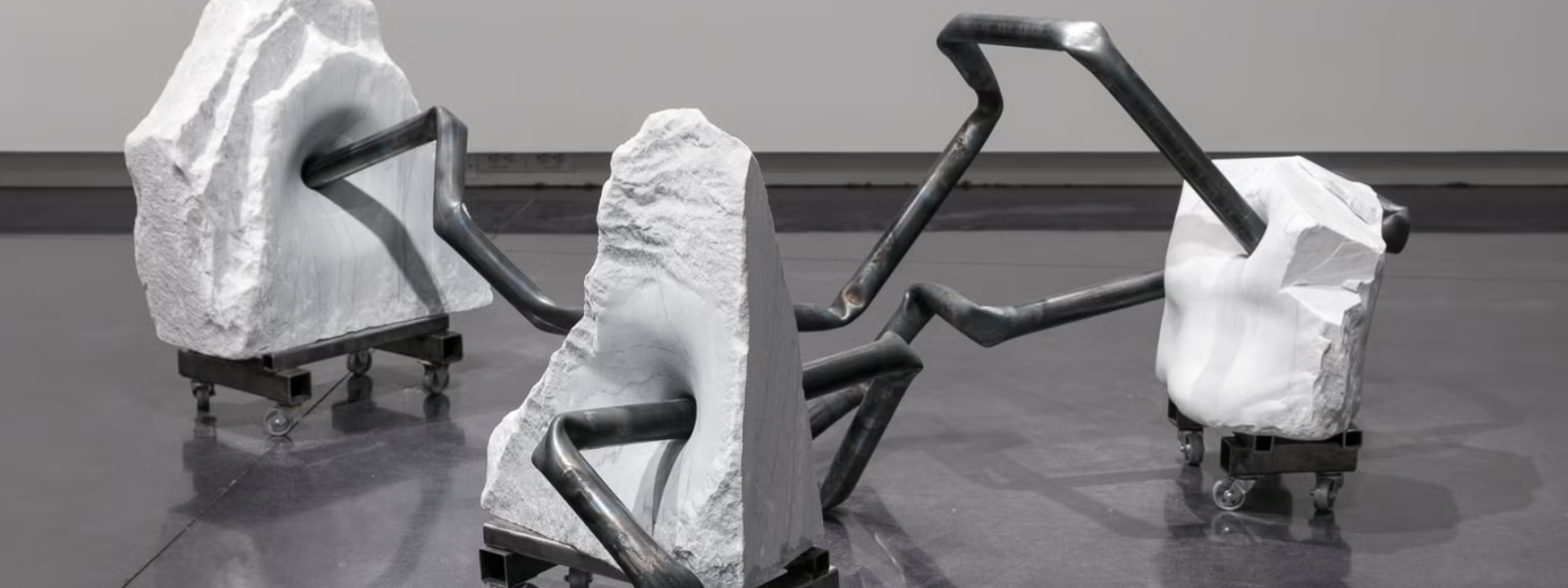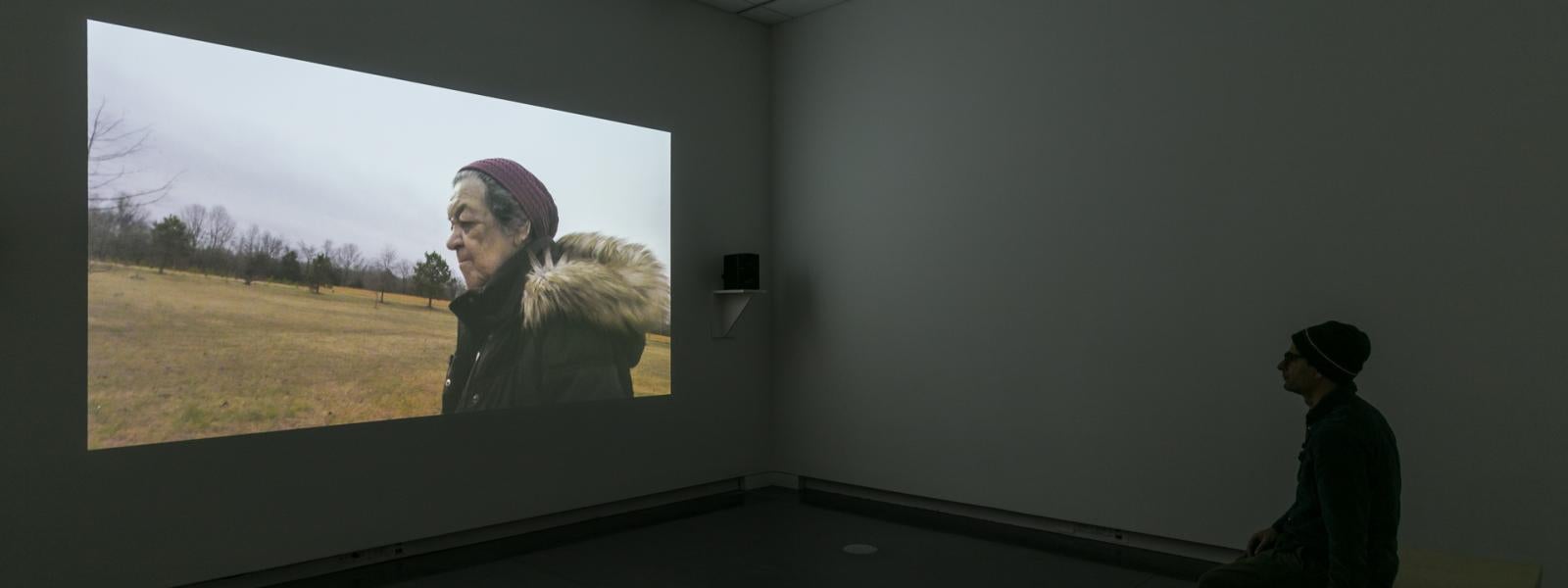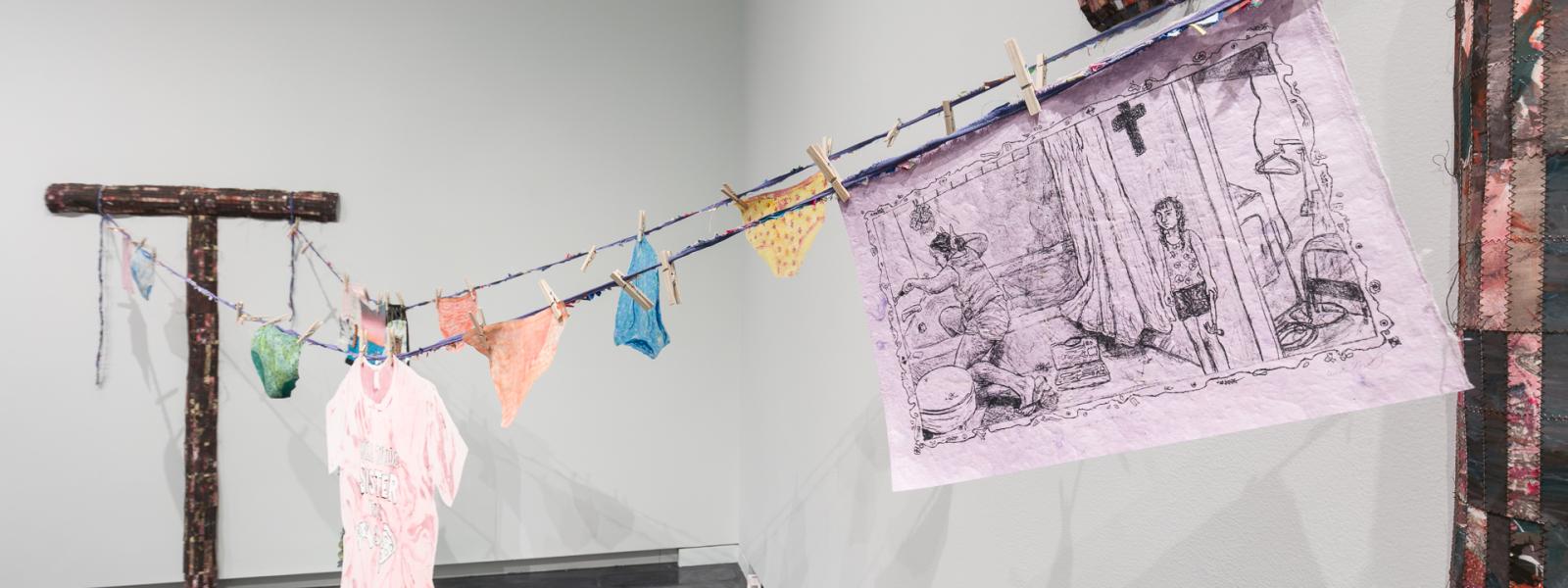MFA in Art Practices
The MFA in Art Practices
The MFA in Art Practices is a rigorous program intended for artists committed to pursuing a professional life in the arts. It prepares students for careers as practicing artists and arts professionals as well as teachers in colleges, universities, and art schools. During the 2 1/2 or 3-year program (track dependent), students focus on one of several fields including, Ceramics, Film, IMAP (photography, digital media, video, integrated arts), Painting and Drawing, Printmaking, and Sculpture and Post-Studio Practice. Additionally, in collaboration with the Department of Cinema Studies & Moving Image Arts, the Department of Art and Art History offers a film MFA.
Fields of Study
- Ceramics
- Drawing & Painting
- Film
- Interdisciplinary Media Arts Practices or IMAP (photography, digital media, video, integrated arts)
- Printmaking
- Sculpture and Post-Studio Practice
The MFA Degree Requirements
The MFA program is a two 1/2 or 3-year program, depending on your degree track.
The degree requires a minimum of 54 credit hours of coursework, of which 36 credit hours must be taken in residence on the Boulder campus, with the following requirements.
- Home studio (major area): 12 credit hours minimum.
- Electives: 21 credit hours (studio and non-studio); up to 6 credit hours may be taken in an allied field at the 3000 level or above.
- Art History, Theory, or Film Critical Studies: 9 credit hours. Independent study courses may not be used to fulfill these requirements. 3 hours of art history. This includes any ARTH course at the 5000 level or above. 3 hours of theory. A list of courses that fulfill the theory requirement is approved by the Graduate Curriculum Committee or Studio Arts Curriculum Committee and maintained by the graduate program coordinator. Students or faculty members may petition the Committee to have courses added to this list. 3 hours of art history or theory as defined above, or film critical studies. Film critical studies is defined as an ARTF non-studio course at the 5000 level or above.
- Visiting Artist Seminar: 3 credit hours.
- Graduate Art Seminar: 3 credit hours
- Thesis: 6 credit hours
The graduate curriculum committee has determined the criteria for courses that would meet the theory requirement. A theory course should offer an overview of a range of different theoretical points of view require continuous theoretical readings throughout the semester require substantial analytical and/or research-based writing provide a historical framework for the theories discussed compare various and competing theories courses which have been reviewed and approved by the graduate curriculum committee prior to the fall semester and later by the studio arts curriculum committee include:
- ARTH 6929 Theories of Art History
- ARTH 6150 Critical and Theoretical Issues in Museum Studies
- ARTH 6939 Representation and Gender in the Americas
- ARTH 6939 Artists’ Ways of Knowing
- ARTS 5087 Remix Culture
- ARTS 5217 Art and Race/Ethnicity
- ARTS 5457 Sound Art Seminar
- ARTF 5024 Snapshots, Memories & Home Movies: Mining the Personal Archive
- ARTF 5004: Topics in Film Theory: Science on the Screen
- COML 6040 Art After Metaphysics
- ENGL 5019 Survey of Contemporary Theory
- GRMN 5030 Foundations of Critical Theory
- WGST 6796: Queer Theories
- WMST 6090: Feminist Theories
- IAWP 6100 Theory and Practice of Doing
- ARTS 5060 Art Writing as a Practice
*Any student or faculty member may petition the studio arts curriculum committee to have courses added to this list.
MFA Sequence of Completion
1. Upon Admission
- Assignment of Advisor
Upon admission, students are assigned a tenured or tenure-track faculty member to serve as an academic advisor in the student’s area of purpose. The academic advisor will meet with the student in the first month of the semester to establish the membership of the student’s committee. A student can petition the curriculum committee in writing to switch from the advisor they were assigned to a new advisor of the student's choosing in their area, with no reason given by the student if the new advisor is willing to take on this duty. A student can change advisors in this fashion just once during their time in the program. An acceptance of this advisee should be sent to the curriculum committee by the new advisor. Any subsequent advisor change requests must be in the form of a written petition to the curriculum committee stating a reason for the advisor change. All advisor changes should be done prior to thesis semester registration.
2. Faculty Committee
The committee consists of a minimum of three faculty members and one second-year graduate student. The advisor serves as chair. There should be one additional studio faculty member. It is strongly suggested that the third faculty member come from Art History, Film Studies, or a field allied to the student’s work. Additional studio or non-studio faculty members may be added. It is strongly recommended that at least one faculty member is from the student’s major area of study. The second-year graduate student is a non-voting member and serves only for the first semester review and the first year review. The graduate student member is encouraged to participate in all discussions at the committee meeting but is required to leave before deliberation on the outcome of the first-year review. All members of the committee must consent to serve on the committee.
Just as graduate students must appeal to the curriculum committee if they wish to change their advisor or the makeup of their committee, faculty members also must make a written petition to the department curriculum committee if they no longer wish to serve on a graduate student’s pre-thesis or thesis committee. This petition must be made at least two weeks in advance of the scheduled pre-thesis or thesis committee meeting.
3. First Semester Review
It is the graduate student’s responsibility to work with their graduate advisor, their committee, and the Associate Chair (if necessary) to schedule all required committee meetings.
The committee will meet with the student at the completion of the first semester, in order to give feedback to the student with regard to progress towards the degree.
The first semester review is meant to be instructional; no formal recommendations are given by the committee.
4. First Year Review
At the end of the first year, the committee is convened for a first year review. The student should be scheduled to have at least twelve credits completed at the end of the semester in which the first year review takes place. The purpose of the first year review is to review and evaluate the student’s progress in the program and to determine if:
- The student continues in the program with or without specific requirements as outlined by the committee
- The student takes a semester or a year off from the program, and has a second review at the end of the time off, before being re-admitted
- The student does not continue in the program
The membership of the committee must be determined two weeks before the year end review; the names of the committee members must be submitted to the Graduate Program Coordinator at this time. To change a committee member or an advisor after the first year review requires a written petition to the curriculum committee of the department. Students who do not complete the first year review successfully may appeal the student’s first year review committee decision by submitting a written petition to the curriculum committee which will request a written response to the petition from each member of the first year review committee. The decision of the curriculum committee is final.
5. Pre-Thesis Review
Students will complete their pre-thesis review only after successfully completing their first year review and not later than the fourteenth week of the semester preceding their graduating semester. Pre-Thesis forms are available from the Graduate Program Coordinator in the department’s main office. It is the graduate students responsibility to work with their graduate advisor, their committee, and the Associate Chair (if necessary) to schedule the pre-thesis teview date and to make arrangements with all committee members. The purpose of the pre-thesis review is for the graduate student to present the focus of their written thesis and exhibition and to review and evaluate the student’s progress in the program and to determine if:
- The student continues in the program with or without specific requirements as outlined by the committee
- The student takes a semester or a year off from the program, and has a second review at the end of the time off, before being re-admitted
- The student does not continue in the program
At the pre-thesis review the graduate student must present and discuss ideas regarding their upcoming thesis exhibition, the presentation of the work, its setup and dates and present a written thesis abstract and bibliography. The thesis abstract and bibliography must be submitted to the committee no later than two weeks prior to the pre-thesis review. Failure to present these materials on time will move the pre-thesis review to the following semester and the graduate student will not be permitted to register for thesis hours. All committee members must sign the pre-thesis review form after the successful review, authorizing the Graduate Program Coordinator to register the graduate student for thesis credit hours. Students who do not complete the pre-thesis review successfully may appeal the committee’s decision by submitting a written petition to the studio arts curriculum committee, which will request a written response to the petition from each member of the committee. The decision of the curriculum committee is final.
6. Thesis Review
- The graduate student, in consultation with their graduate advisor, should apply for admission for candidacy for thesis.
- This application is due in the Graduate School at the beginning of the final semester.
- Candidacy application forms and diploma cards are available from and must be returned to the Graduate Program Coordinator who forwards them to the Graduate School by the established deadline.
7. Thesis, Exhibition & Defense
At least two weeks prior to the thesis defense the Master’s Examination Report (notification of the date and time of the thesis defense and the composition of the Thesis Committee) is due in the Graduate School. Forms are available from and must be returned to the Graduate Program Coordinator who forwards them to the Graduate School. The master’s examination report form with the Graduate School’s approval of the thesis committee must be presented at the thesis defense and signed by all thesis committee members. The Chair of the thesis committee also fills out and signs a final grade card which is available from and must be returned to the Graduate Program Coordinator who forwards them to the Graduate School by the established deadline.
The MFA thesis defense must be conducted while the graduate student’s exhibition is on view. The Graduate School requires that any master’s degree must be completed within four years of the beginning of course work. However, it is the departmental requirement that the MFA degree be completed within 2.5 years. If the student wishes to extend their time for completing their degree, they must petition their area as well as their committee. Students who do not complete the thesis defense successfully will leave the program without receiving the MFA degree. The graduate student may appeal the thesis defense committee’s decision by submitting a written petition to the studio arts curriculum committee which will request a written response to the petition from each member of the student’s thesis committee. The decision of the curriculum committee is final.
Graduate students must meet with their graduate advisor and the Exhibitions Manager in the CU Art Museum to discuss the display of the graduate thesis exhibition and to be aware of the rights and responsibilities incurred with such display and exhibition. Graduate students are advised that if their artwork will in some manner deal with human or animal subjects that they should be aware of university policy statements on these subjects.
8. Final Thesis
The MFA Thesis must be submitted in its final draft form to all the thesis committee members two weeks prior to the scheduled thesis defense. The thesis should contextualize the student’s work, examining the work of other artists and scholars who have addressed similar issues. In most cases, the master’s thesis is a 15-20 page paper, exclusive of endnotes, bibliography, and illustrations. The Graduate School’s specifications for preparation of the master’s thesis and doctoral dissertations must be used to prepare the MFA Thesis. These specifications can be found on the Graduate School’s website. MFA theses are not submitted to the Graduate School or elsewhere electronically. They do not require the Graduate School’s approval or any other involvement.
Two copies of the final version, approved and signed by the student’s thesis committee, are submitted to the Graduate Program Coordinator. One copy remains in the student’s file and the other copy is forwarded to Norlin Library where it is bound and stored as part of the MFA thesis collection in the Art and Architecture Library. The written thesis should be determined in consultation with your thesis advisor and thesis committee members.
The thesis must be accompanied by fifteen (15) digital images documenting your exhibition, including installation views, along with descriptive information. For specific instructions see the document titled "MFA Thesis Exhibition Digital Image Submission Form". After the defense, two copies of the thesis, with the required signatures on the signature sheet, must be turned into the Graduate Program Coordinator. One of these is catalogued in the Norlin Library. The digital images and accompanying descriptive information must be turned into the Graduate Program Coordinator prior to the end of the semester in which the MFA thesis is exhibited and defended. They are housed in the Visual Resources Collection database. The student’s final grade will not be entered until the thesis and the images are submitted to the Graduate Program Coordinator and the Visual Resources Center, respectively.







